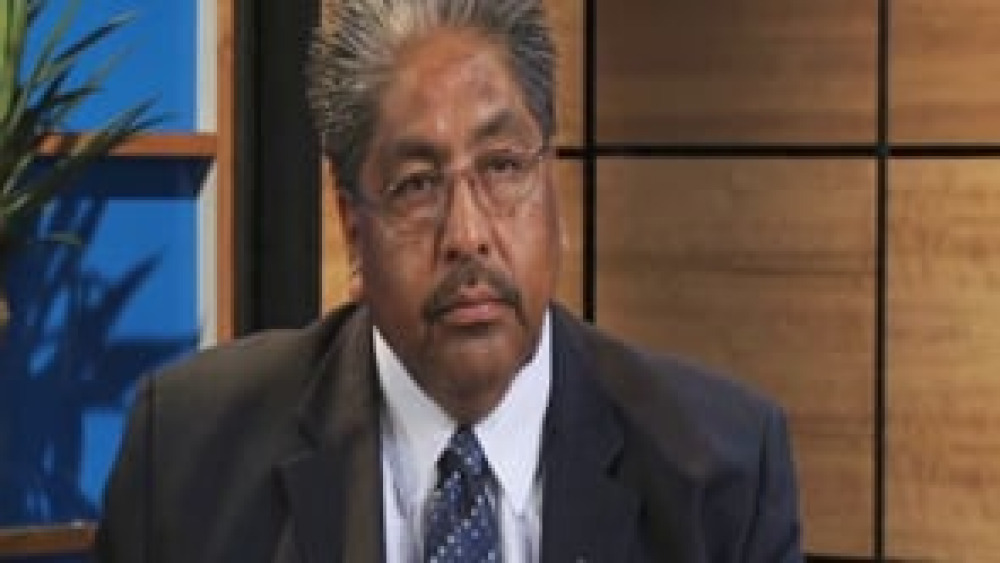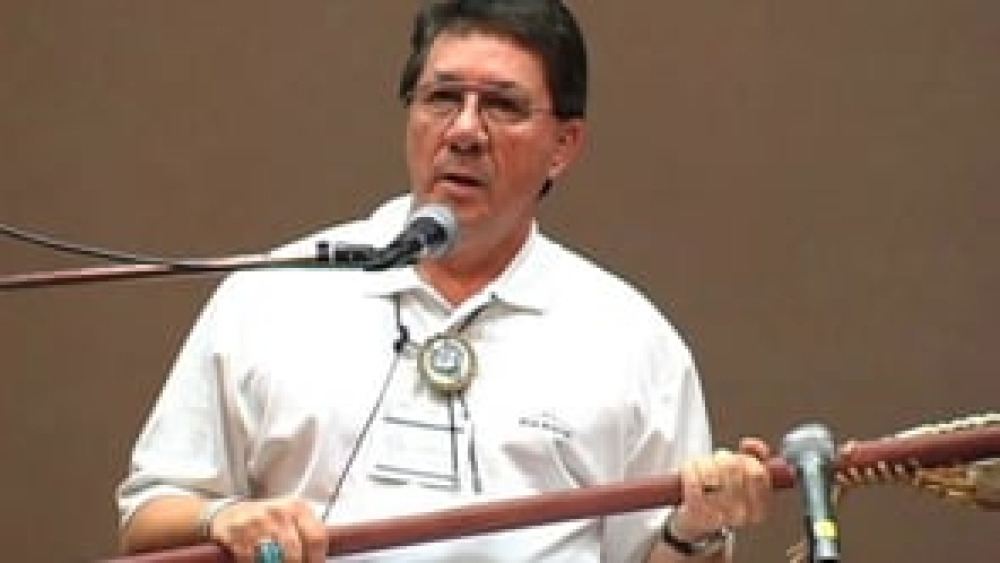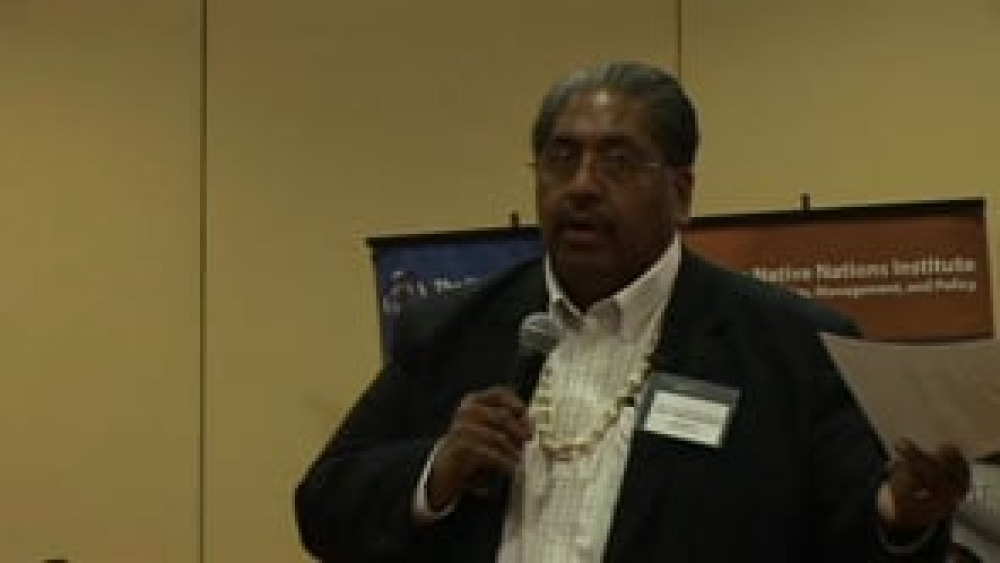Tohono O'odham Nation Chairman Ned Norris, Jr. speaks to aspiring and current Native nation leaders about the keys to being an effective leader and shares his personal experiences in preparing to become the leader of his nation.
Additional Information
Norris, Jr., Ned. "Perspectives on Leadership and Nation Building." Emerging Leaders seminar. Native Nations Institute for Leadership, Management, and Policy, University of Arizona. Tucson, Arizona. March 26, 2008. Presentation.
Transcript
"Thank you. How is everybody? Good. Alright! Thank you, Manley Begay, for that introduction. I just wanted to take this opportunity to welcome you, welcoming you to the Tohono O'odham Nation and welcome to our home. This is one of our business facilities that we just opened in the beginning of January [2008] and we're pretty proud of it. We're proud of what we have been able to accomplish thus far, and realize that there are more things ahead of us that we know and that we may not know that we'd like to accomplish for our people. This gives us the opportunity to establish some economic base for us to do some of those things that we just dream about.
Just a little bit of a background, the Tohono O'odham Nation, when you think about our ancestral lands, you will know that the ancestral lands of the O'odham include those lands which are where the city of Tucson sits today all the way east to where the Rincon Mountains are at, all the way north to the city of Phoenix and Scottsdale is at, all the way west to where the Colorado River is, and all the way south some 130 miles south of what is not the international border of Mexico. Those are ancestral lands of our people, of the O'odham. Today, we ended up with 2.8 million square acres and always tell an audience, 'We're 2.8 million square acres small.' And usually when you have a non-Indian audience, they kind of look at you like, ‘What are you talking about? 2.8 million square acres is a pretty big piece of land.' But when you think about the ancestral lands of our people, 2.8 million is nothing. So I wanted to give you that background. Also, we have about 28,000 enrolled tribal members, so there are about 28,000 of us running around here in the United States and in some other countries. In fact, we have about 1,500 enrolled tribal members that live in Mexico and not necessarily because they want to live in Mexico, it is because when the international border was established, they cut them off from the rest of the people, from the rest of the land here. We continue to have about nine communities that still exist within Mexico, and my trip to Nogales, Sonora this afternoon is meeting with a couple of members of the O'odham in Mexico, because the lawyer that they are working with can't get on this side of the United States, so we're going to go meet with him down there and talk a little bit about land issues that are important to us that still exist in Mexico.
And actually I wanted to get a feel of the audience. I was asking Manley Begay, ‘Who is the audience here?' And he said to me that ‘there are newly elected tribal leaders here, there are aspiring tribal leaders here.' I was speaking to one of the young persons here and they said there are some people from a college up in Phoenix area that are here to learn about leadership, and learn about what you might want to be thinking about as you are emerging into a tribal leader. And then I was also told that there are some emerging old tribal leaders, and I'm like emerging old tribal leaders, and I'm wondering what he's talking about. And I'm assuming that they are those newly tribal elected leaders that, for some odd reason, you decided to get back into the thick of the politics and get elected again, so you're back. It's a return of the old leadership. He pointed out a couple of you to me, take for example, ‘So and so over there or so and so over there, they are old returning tribal leaders.' And I won't point you out because you know who you are.
I was sharing with Manley that I knew I wanted to do this job 30 years ago. I knew I wanted to be the Chairman of the Tohono O'odham Nation 30 years ago. When I started my first job in 1977 as the assistant director for the Tohono O'odham Nation Children's Home, I knew someday I wanted to hold this job. And over the course of the last 30 years, I have done different things -- consciously and sub-consciously -- preparing myself for this day, preparing myself for this job. And people ask me today, ‘How do you like what you're doing?' And I tell them, ‘I love it. I love this job. It's everything that a job needs to be. It's challenging, it's exciting, it's frustrating, it's disappointing.' All of those things that our jobs need to be in order for us to grow, in order for us to challenge ourselves, in order for us to be challenged. We have to have all of those experiences, all of those ingredients in order for us to be successful as tribal leaders. And I know that over the course of the last 30 years, there are things that I have done in my life that probably put question on whether or not I should or shouldn't be elected as a tribal leader. And I think every single person in this room has done something questionable in their lives that may have put question on whether or not we should elect you or not elect you, but you know, we learn from those situations as well. We learn from those mistakes. We learn from that part of the journey in our lives in order to prepare us for what we are doing today as tribal leaders. And that's the way I like to look at it. That is the way I like to look at the past 30 years. And I've been married for 35 years. My wife -- and actually I tell this story -- that my wife has put up with me for 35 years. We just had our 35th anniversary in February, and I'll share with you now that in the 35 years that we have been together, there have been things that I've done that would have probably required her or wanted her or forced her to leave me, but she didn't. She didn't leave me, she didn't give up on me. For some reason, she believed in me and my ability and my capability, and I love her more today for not giving up on me because she stood by me. And I always say that, ‘Behind a good man, there is always an even greater woman,' the woman that is there to help us, to pick us up when we fall. To help us gain the strength or regain the strength we may have lost at different times in our life, and so I appreciate that of her.
You know, over the course of my years involved in politics -- and we see sometimes on the TV commercials, the commercial about Michael Jordan and there was a commercial that said, ‘Be like Mike.' It caught a lot of the attention of our young people: ‘Be like Mike Jordan, buy these $250 tennis shoes and you can be like Mike Jordan. Be like Mike.' Well, you know, there's people in my life that I would like to be like, that I had sat back years ago watching leaders, watching aspiring leaders, watching people over the course of time that I have said, ‘You know what, I'd like to be like that person. I'd like to be like that leader. I'd like to be able to think like that leader. I'd like to be able to have the good heart that I see that leader have and be like them.' Just like the commercial is saying, ‘Be like Mike.' There are several Mike people out there that I would like to have been like. You know it really is an honor for me to be standing in front of you sharing these thoughts with you, because one of those people that were ‘Be like Mike' for me in my life' was Dr. Peterson Zah. I am standing up here thinking, ‘What am I going to be able to say to Dr. Zah that is going to make any sense or that he hasn't already said or has already experienced himself?' So it is an honor for me to stand in front of you, sir, and be able to share some thoughts with you, because I'm thinking, ‘Man, I can't share, I can't teach you anything.' But it's out of that respect that I hold for him as a leader, as a continued leader, and what he's been able to do not only for his own people, but for all nations, all tribal people nationwide.
One of the things that I have shared with different audiences is some of these quotes. I keep these, I keep some quotes in this thing that we use now called this Blackberry, and I keep these in here because at times over the course of, you know, when you are feeling down or when you are feeling like maybe you're questioning what you are doing or questioning the worth of what you are doing, I go back to these and I start reading these. One of the things that I've always thought about -- and I try to live my own leadership ability after -- is this quote, and it says, ‘You can accomplish anything in life provided that you do not mind who gets the credit.' 'You can accomplish anything in life provided that you do not mind who gets the credit.' As leaders -- and that quote is attributed to Harry Truman -- as leaders I like to think of myself in that way. That what I have to do -- the people have entrusted in me their trust to lead them and to guide them for the term that I have been elected. As a leader, I should not ever take advantage of that trust that the people have placed in me. I should never take the position that, ‘That was my idea, not yours.' I should not take the position that, ‘It's my way or the highway.' As a leader, that should not -- that's not something that we should be doing as tribal leaders. The [Tohono O'odham Nation] vice chairman and I -- Isidro Lopez -- when we ran for these offices, we ran on a campaign that we say in O'odham, it says [O'odham language], and [O'odham language] translates to ‘All of us together.' And what we wanted to be able to do was to bring the people together, to bring our people together, to give our people the opportunity to actively participate in the decision-making process. Too many times, we get tribal leadership that think they are going to impose those decisions on the people. We can't accomplish that, we can't accomplish what we need to accomplish if we are going to dictate to our people. That's not our purpose. Our purpose is to lead, our purpose is to work together, and our purpose is to bring our people to the table so that we can hear what they have to say. And there have been times in the last nine months that the Vice Chairman and I have served in office that people have said, ‘So much for [O'odham language], because I thought we were going to work together.' And that is because they were on the short end of a decision. You know, and we have said that this theme is going to be the heartbeat of our tenure in office. We intend to make sure of that. Now, people need to understand that we're not always going to agree on what the outcome of a decision is. We can't expect to always agree. There are going to be things that we disagree with each other on, but we are always going to make the effort to try and involve you in the decision-making process. So that is what I wanted to share with you on that.
The other quote that I look at, that I've always tried to model my leadership after, it says here, ‘The best executive is one who has sense enough to pick good people to do what he or she wants done, and self-restraint to keep from meddling with them while they do it.' You know we're elected leaders, we are elected to lead, we are elected to direct. I always make comments to my staff, I say, ‘We only are as good as you are.' You know, we end up getting the credit for a lot of the work that a lot of other people that aren't elected leaders do, and I try every time to let my staff do what they need to do in order to get done what I gave them the direction to do. If I keep meddling in what they are doing and micromanaging what they're doing, why do I have them? If I'm going to take that responsibility, why do I have them there to do that job? So that's what I like to look at and think about at times.
One last one that I want to share with you is -- wow, what happened to it? But I remember it, because I remember it off of a fortune cookie, and I put that thing in my wallet many, many years ago, probably about 20 years ago at least. I know that for a fact. I opened this fortune cookie and I read it and it says that, ‘One of the greatest things in life is doing what people say you can't do. One of the greatest things in life is doing what people say you cannot do.' I usually use that in an audience of young people, of teenagers, high-school age, and I tell them, 'I'm not telling you to be defiant. I'm not suggesting you violate school rules or the rules of the household. What I am telling you is that when people stand there and tell you that, ‘You are not going to [amount] to anything. All you are is a troublemaker, and you are not going to be worth anything in your life,' that you challenge them on that.' And I stand here before you and tell you that I was one of those students. I was told that by a teacher in high school at one time. You know I probably gave him reason to think I was going to be worthless. I probably gave my family reason to think I was worthless. I know I gave my wife reason to think I was worthless, but you know I took that and I try to live that as a challenge to me in my life as a leader.
So those are things that I wanted to share with you. I really am honored that I was given the opportunity to stand in front of you and to share these thoughts with you and that you were actually listening. I was wondering, ‘This is going to be difficult. I'm going to be hearing papers clashing and cups making noise.' I've talked to audiences before lunchtime before, and I might as well just not stand here and say nothing because nobody is listening, but that's not true today. I see you listen, I feel listening, I see what you are doing here. And in closing, I wish all of you the best of success in your leadership. I wish all of you the best of success for your people, for your tribes. You know we have many, many challenges ahead of us. And I say that it's been nine months that we've been in office, but it feels like nine years. I think in nine months my hair had grayed more than it has if I wasn't sitting in this office, but you know that is the sacrifice that we make. That is the sacrifice that we make. And I wish all of you well. I congratulate you for the positions that you were elected to lead in, and I want to say to those young emerging leaders, ‘Stay on course, stay focused, and know that you have support out there.'
I want to share this last thought with you. One of the most honorable times that I was honored in my life in being able to sit down at a lunch table with the late Wendell Chino. Years ago, Wendell Chino, a great Mescalero Apache leader for many many years. He was one of those ‘Mike' people for me, it was like I wanted to be like Wendell Chino. I wanted to have his drive, his same good heart, and his same good thoughts. One time we were sitting at a luncheon and it was just, it ended up me and him being the last ones at the table and I was like, ‘Wow, man I'm sitting here with Wendell Chino, man, this is great!' I started picking his brain about leadership and at the end, he said, ‘You know what the sign of a true Indian leader is?' I'm asking does anybody in this room know what the sign of a true Indian leader is? And he said, ‘It's those people that can take the bullets from the front and the arrows in the back.' So be prepared for those bullets and those arrows. Thank you very much."



